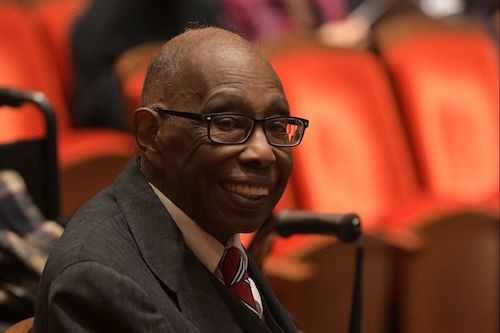by Jarrett Hoffman
GRAB BAG — NEWS, ARTICLES & VIDEOS:
Music teacher Sakira Ventura of Valencia, Spain, has created an interactive map featuring over 500 women composers from around the globe (pictured). “I had always talked about putting these composers on the map – so it occurred to me to do it literally.” Read her interview with The Guardian here, where you can also find the map itself.
The Canton Youth Symphonies and music director Matthew Jenkins Jaroszewicz are hosting auditions for the 2021-22 season from August 29 through September 1. Sign up here.
The Cleveland Orchestra has announced that its Mindful Music Moments series — four-minute modules featuring mindfulness prompts and classical music performed by the Orchestra — will be free for all Northeast Ohio schools through the upcoming academic year. See an example, and register here (Pre-K) or here (K-12).
And as part of the MusiCLE Yours project, four Cleveland Orchestra musicians — violinists Isabel Trautwein and Emma Shook, violist Lisa Boyko, and cellist Tanya Ell — came together at the Crawford Auto Aviation Museum of the Cleveland History Center to record the first movement of Dame Ethel Smyth’s String Quartet in e. Watch here.
ONLINE TODAY:
The area takes a breather to begin the week after a nice schedule of events this past weekend, but the internet beckons. Copland House presents Viet Cuong’s Fine Lines at 1 pm and 7 pm, the Pittsburgh Symphony gives a musical tour of Hollywood at 7:30, and the Chamber Music Society of Lincoln Center features the piano trio as heard from Beethoven and Saint-Saens, also beginning at 7:30 (and available for a year). Details in Musical America’s streaming guide.
TODAY’S ALMANAC:
American composer, pianist, and organist George Walker — who died on this date in 2018 in Montclair, New Jersey — was a true trailblazer.
Most famously, he was the first Black composer to win the Pulitzer Prize for Music (1996). But even fifty years earlier, he was breaking boundaries. In 1945, Walker not only became the first Black pianist to give a recital at New York’s Town Hall, but also the first Black instrumentalist to solo with the Philadelphia Orchestra, and one of the first Black graduates of the Curtis Institute of Music. (As for local connections, his studies at Curtis followed his graduation at age 18 from Oberlin College.)
His academic career was long and impressive, including posts at the New School, Rutgers University, the University of Colorado, the Peabody Institute, the University of Delaware, and Smith College, where he became the first Black tenured member of the faculty.
It’s important to emphasize those firsts, but also to move beyond them in framing Walker’s career. In a 1987 interview, he reflected on being termed an “African-American composer” rather than just an American composer:
I’ve benefited from being a black composer in the sense that when there are symposiums given of music by black composers, I would get performances by orchestras that otherwise would not have done the works. The other aspect, of course, is that if I were not black, I would have had a far wider dispersion of my music and more performances.
Here are a few works to begin immersing yourself in the world of this great, underperformed American composer.
His most popular piece is the 1990 Lyric for Strings, which he adapted from the second movement of his First String Quartet (1946). It’s interesting to hear both versions — the sparer beauty of the quartet, and the warmer and richer string-orchestra piece.
Many other works are more stylistically thorny, including his Pulitzer-winning (by unanimous decision) Lilacs for Voice and Orchestra, which sets a text by Walt Whitman in reflecting on the assassination of Abraham Lincoln.
And moving from that large ensemble down to the opposite, Oberlin faculty violinist David Bowlin recorded Walker’s 2011 solo work Bleu to excellent effect on the album Bird As Prophet. A personal favorite of mine — complex and accessible, emotive and playful all at the same time — Bleu was written for the composer’s son Gregory Walker, a composer himself as well as a violinist.
It wasn’t until age 87 that George Walker began to write for his son — with the 2008 Violin Concerto — and even then, Gregory Walker wasn’t aware of it until it showed up in the mail.
“Didn’t know about it until it was too late,” he deadpanned in an interview with NPR.





